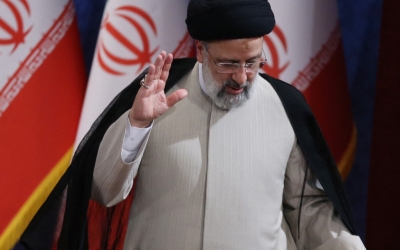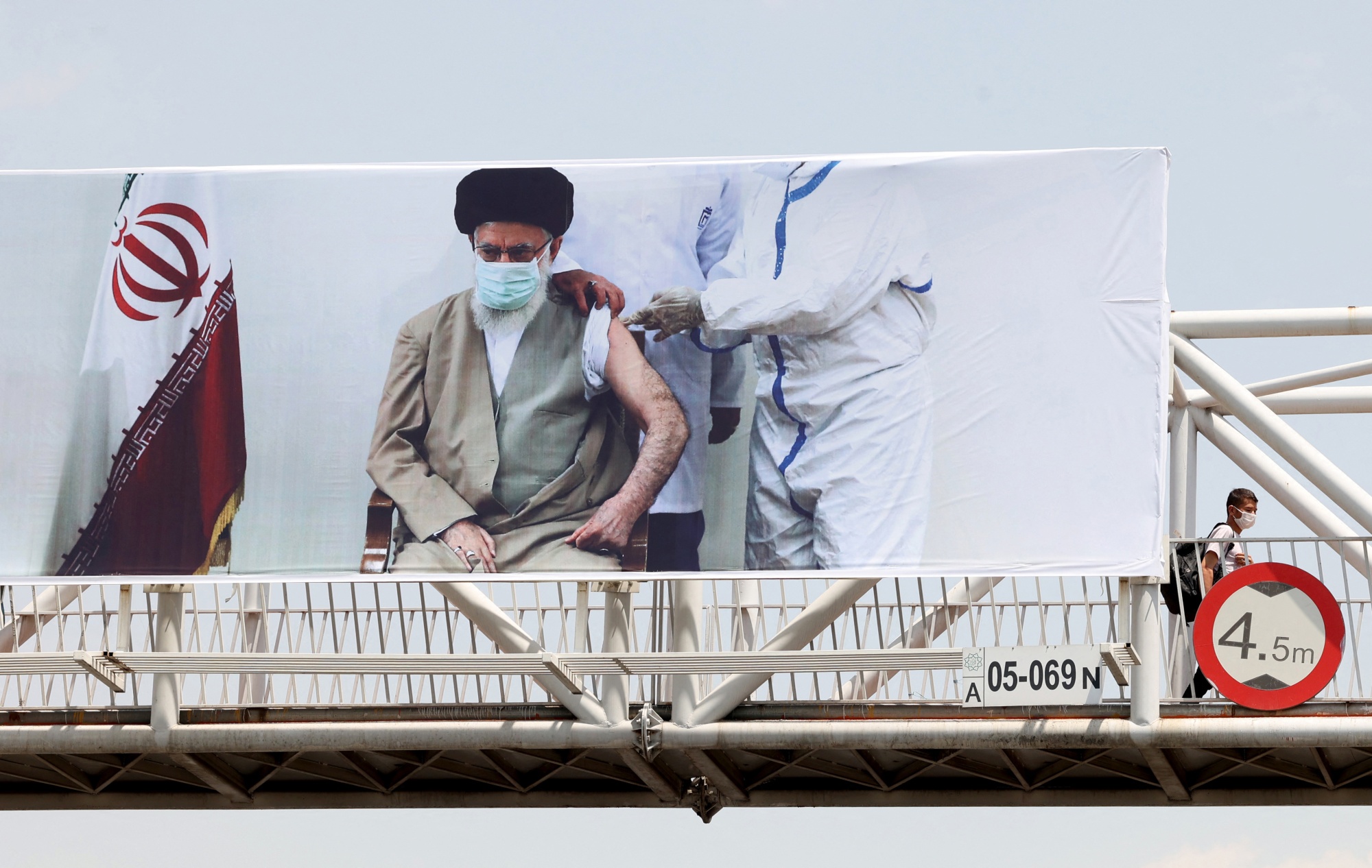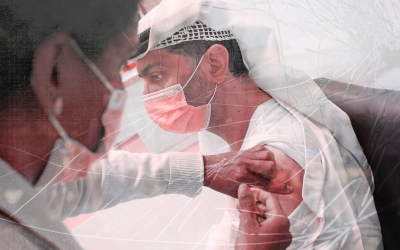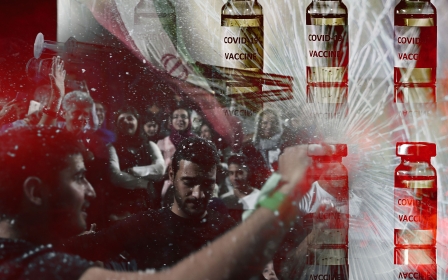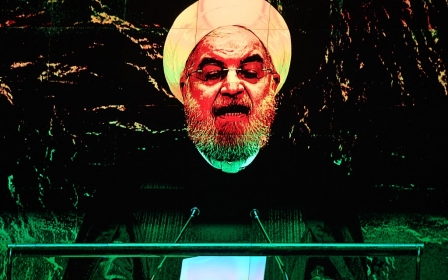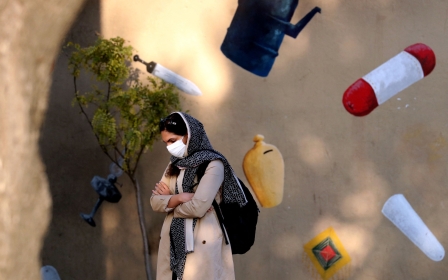Covid-19 in Iran: What happened to Rouhani's vaccine promises?
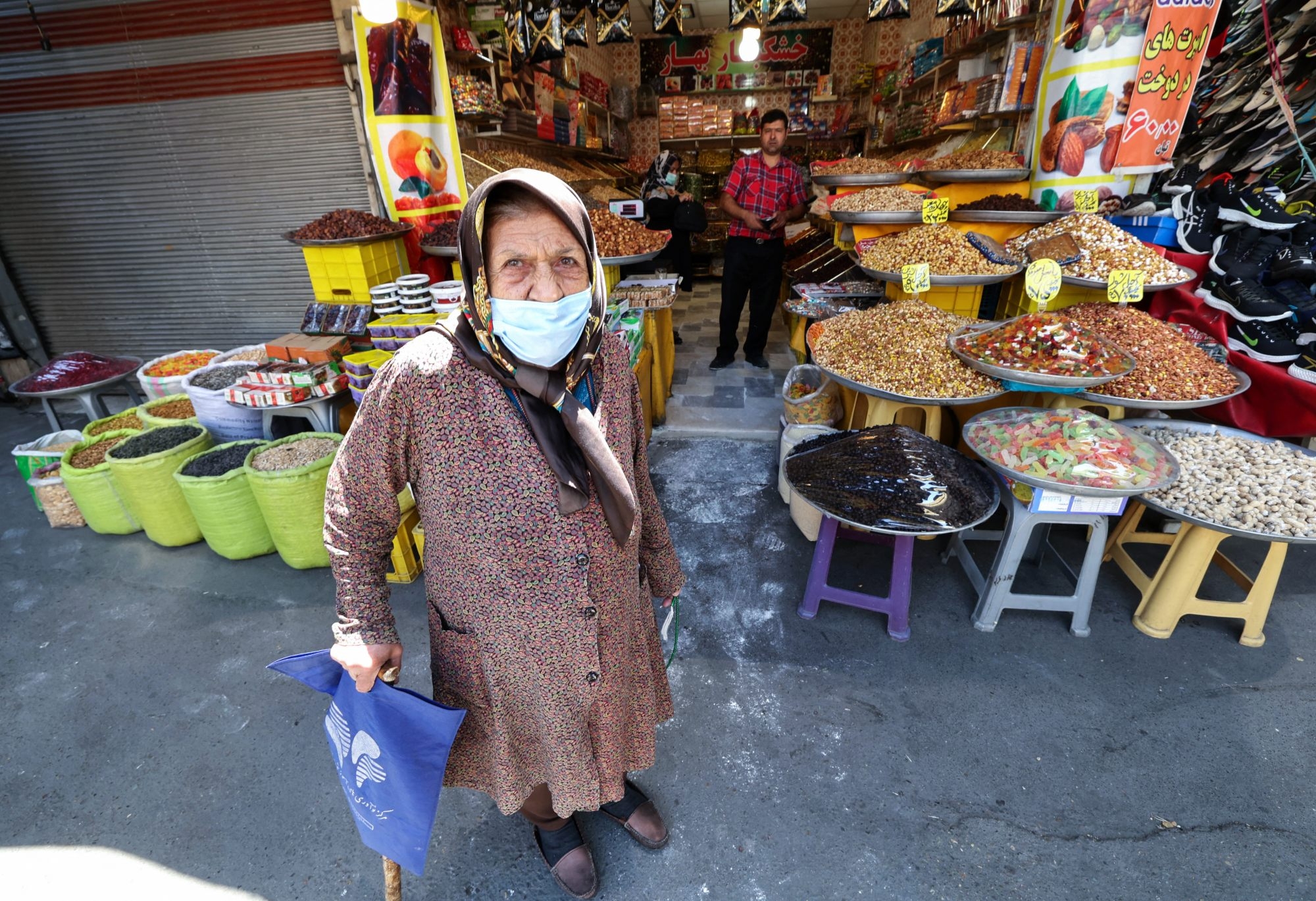
As Hassan Rouhani spent his final days in office as Iran’s president earlier this month, his administration hailed its handling of the Covid-19 pandemic.
On 1 August, Rouhani and government health officials held their last meeting at the National Headquarters to Combat Coronavirus. "The promises we made to vaccinate all elderly people and high-risk groups are now coming true," Rouhani declared.
New MEE newsletter: Jerusalem Dispatch
Sign up to get the latest insights and analysis on Israel-Palestine, alongside Turkey Unpacked and other MEE newsletters
Yet on Sunday, only three days after Rouhani stepped down in favour of his successor, Ebrahim Raisi, Iran once again set a new grim record: 542 deaths in one day, in what officials have called a "fifth wave" of the outbreak.
Since the beginning of the pandemic, Iran has recorded nearly 4.3 million coronavirus cases - out of a population of over 85 million - with over 94,000 people succumbing to the virus, the highest death toll in the Middle East.
According to the Johns Hopkins University School of Medicine, based on official data, Iran is among the 10 countries in the world with the highest per capita death toll, with 2.3 percent of all cases proving fatal.
Yet these are only the official numbers; healthcare experts inside Iran suggest the real toll may be at least twice as high.
While hospitals in the country struggle with the influx of dying Covid-19 patients, only 3.3 percent of Iranians have been fully vaccinated.
Rouhani's self-congratulatory comments were only the latest false claims made by his administration since the pandemic broke out in Iran in February 2020. The president and his officials had promised a solid supply of vaccines for the whole country - and beyond - through imports, collaboration with China and Russia, and the production of Iran’s own homegrown jab.
The government’s lofty promises came after Tehran had a late start on tackling the pandemic, with Rouhani’s administration accused of hiding the outbreak of the virus in the country in an effort to secure a large turnout in February 2020 legislative elections.
Since then, the country's fight to contain the pandemic has been beset by nationwide shortages in oxygen, hospital beds, medicine and healthcare staff.
But what exactly happened to Iran’s vaccination vows?
Vaccine campaign: in fits and starts
As soon as Covid-19 vaccines began being produced globally, the issue became highly politicised in Iran. In January, Supreme Leader Ayatollah Ali Khamenei banned the import of vaccines manufactured in the United States and the United Kingdom, including the Pfizer, AstraZeneca and Moderna jabs.
"Imports of US and British vaccines into the country are forbidden... They're completely untrustworthy. It's not unlikely they would want to contaminate other nations," Khamenei, the country's highest authority, said at the time. Meanwhile, negotiations with other countries - such as Japan and Korea - to import the Covid-19 vaccine have been hampered by US sanctions on Tehran, Iranian officials have said.
But by 9 May, Rouhani told local media that 13 million high-risk Iranians would be vaccinated by the end of the Iranian month of Tir, on 22 July, thanks in part to the import of jabs from China, Russia and India.
At the time, batches of the Chinese Sinopharm vaccine had finally arrived in Iran after months of delay, allowing the health ministry to speed up the vaccination of all citizens over 75 years old.
A week after Rouhani's promise, Health Minister Saeed Namaki made an even bigger vow.
"Before the end of the Iranian year [21 March 2022], Iran will be among the few countries who will have fully completed their general vaccination,” he said on 18 May. “This is when we will be able to confidently perform Friday prayers and hold religious ceremonies."
But the festive mood among officials was short-lived. By early June, the country faced a severe vaccine shortage after shipments from China and Russia stopped coming in, leaving Tehran no choice but to pause the national vaccination drive. That month, elderly Iranians and healthcare workers who went to vaccination centres to receive their second dose came out empty handed.
Rouhani's administration remained silent about the reasons behind the pause in the general vaccination programme, but Alireza Nadji, head of the virology centre at Tehran's Shahid Beheshti University of Medical Sciences, revealed on 8 June that Beijing, Moscow and New Delhi had not kept up with the agreed pace of deliveries, due in part to high local demand for vaccines in each country.
The general immunisation programme has nonetheless continued in Iran, but has fallen far short of the government’s plans. Data released by the semi-official ISNA news agency on Saturday showed that 3 million Iranians were fully vaccinated as of Friday - 10 million fewer than the number Rouhani had promised. The report put the number of citizens who had received the first dose at 12.1 million - around 14 percent of the population.
Cuba and Russia collaborations fall short
Before vaccine deliveries fell through, Rouhani's administration had announced with much fanfare collaborative efforts with Cuba and Russia to jointly manufacture Covid-19 vaccines and compensate for the ban on British and American jabs.
On 11 January, health officials in Tehran said that Tehran and Havana had begun the process of manufacturing a vaccine without the help of western world powers. Ehsan Mostafavi, the research director of Iran's Pasteur Institute, told local media that the first two phases of a vaccine trial had been successfully completed in Cuba, and that a third phase of human testing would be carried out in Iran.
The news immediately made headlines in the mainstream media, and some foreign relations experts hailed the attempt by the two countries, both heavily sanctioned by the US, to produce the vaccine.
Mostafavi said Iran would receive vaccine production technology from Cuba in the spring, and that the Cuban-Iranian vaccine would be used in Iran as part of its general inoculation programme.
But spring passed, summer came - and yet no news has emerged about the co-produced Cuban vaccine being manufactured in Iran.
In parallel, Iranian officials also promised that Iran and Russia would work together to manufacture vaccines in Iran.
"I am honoured to announce that a Sputnik-V vaccine production line will be launched in Iran in two weeks,” local media quoted Namaki, the health minister, as saying on 22 April, adding: “In the future, the only countries that will be able to vaccinate their population are the vaccine producers."
But three months later, Alireza Reisi, a spokesman for Iran's National Coronavirus Combat Taskforce, announced that no Sputnik vaccines had been produced in Iran, after Moscow decided to sell the production line's output to other states - although the spokesman did not provide further details.
Homegrown vaccine on ice
Amid faltering joint efforts with international allies, Iranian authorities made the most considerable promise of all: that Iran would become the leading vaccine manufacturer in the Middle East, producing and exporting its homegrown jabs.
"I bring good tidings to the honourable nation of Iran, that by the grace of God and the knowledge of local scientists, Iran will become one of the most important poles of Covid-19 vaccine production in the region," local media quoted Namaki as saying on 13 February.
"[Iran will also become] one important exporter of this vaccine to the world in two or three months," he vowed.
By the time Rouhani's administration left office, however, Iran's first domestically produced Covid-19 vaccine, COVIran Barekat, had not yet entered the mass-production phase.
Iranian analysts have suggested that competition between pharmaceutical companies backed respectively by the government and the Islamic Revolutionary Guard Corps (IRGC) have been a major factor in hampering the development of Iran’s own vaccine.
All these unfulfilled promises have meanwhile left Iranians frustrated by the seemingly endless wait for a vaccine, and desperate to find alternatives to receive the jab.
Armenia - one of the few countries where Iranian citizens can travel without visas - has witnessed the world's biggest influx of “vaccine tourism”, with flight prices to Yerevan rocketing as Iranians scramble to travel north to receive the jab. Others, stuck at home, have turned to the black market to buy smuggled doses of Moderna or Pfizer vaccines.
Unlike Rouhani, incoming President Raisi has said little about his plans to tackle the pandemic, whether during his presidential election campaign or since taking office. Raisi's silence has left many Iranians even less hopeful about the outcome of the country's national vaccination programme, as the Delta variant of the virus wreaks further havoc on the country.
Middle East Eye delivers independent and unrivalled coverage and analysis of the Middle East, North Africa and beyond. To learn more about republishing this content and the associated fees, please fill out this form. More about MEE can be found here.


